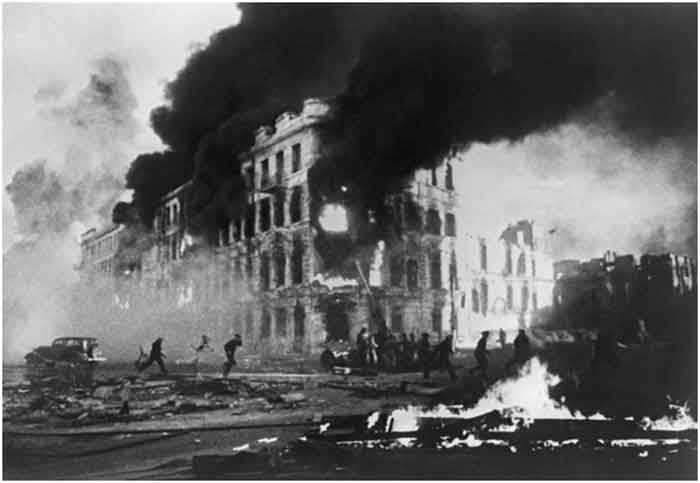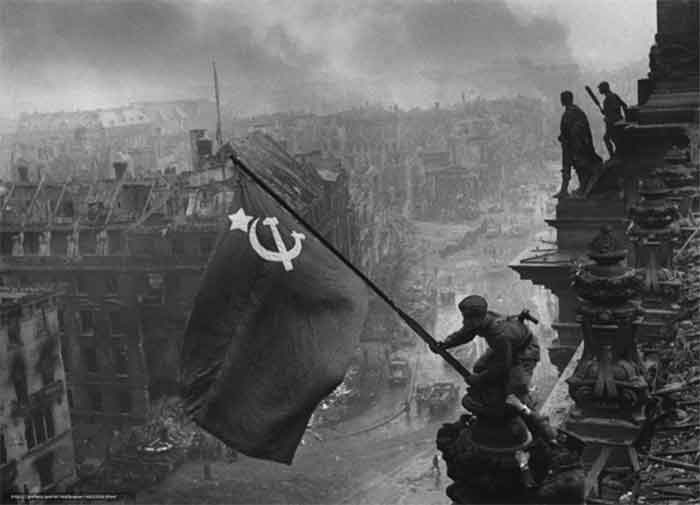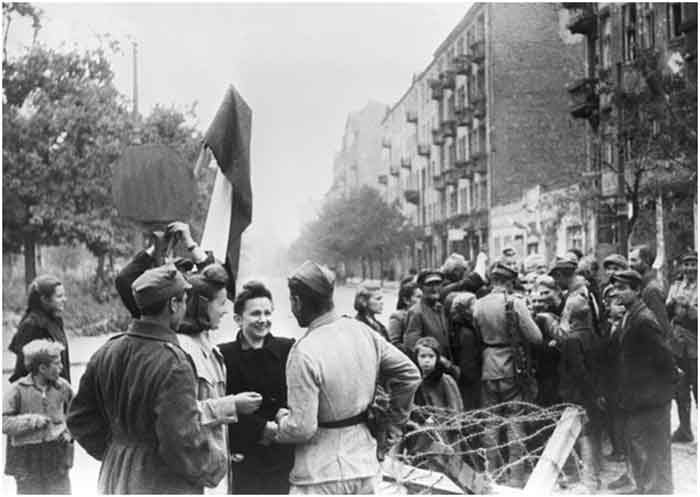
80 years ago, an event took place marking a turning point in shaping the course of the last century and literally saving the fate of mankind. February 2nd marked the 80th anniversary since the end of the Battle of Stalingrad with the complete victory accomplished of the forces of the Red Army and the crushing of the Nazi armies, something that paved tide in the war in favour of the USSR and planted the seeds for the Anti-fascist Victory of the Peoples. Resilience and courage in overcoming an oppressor or sacrifice and heroism taken to heights unscaled.
Background of War
The war fought by the USSR was a Great Patriotic War, a just war of defence. Additionally to the glorious defence, in which the USSR under the leadership of Stalin had to apply scorched land to defend its territory, in what costed more than 25 million lives, the anti-imperialist struggle crystallised vastly in the oppressed nations during this period.
The peoples of the world rose like a phoenix from the ashes and dripped their blood not only in the war against the axis, but also against their respective imperialist masters, what initiated the great anti-colonial struggle in the second half of the 20th century.
With fortifying men, not arms, it was testimony of the Marxist principle about what is most important correct once again. They strangled the invaders to death and fought the greatest battle of war in cities ever seen. It was a war not only waged from street to street, nor from house to house or cellar to cellar, not even floor by floor, but from room by room.
Mao stated: “in this present war the attack on Stalingrad is the expression of the last desperate struggle of fascism itself. At this turning point in history, too, many people in the world anti-fascist front have been deluded by the ferocious appearance of fascism and have failed to discern its essence. For forty-eight days there raged an unprecedentedly bitter battle, unparalleled in the history of mankind–from August 23, when the entire German force crossed the bend of the River Don and began the all-out attack on Stalingrad, through September 15, when some German units broke into the industrial district in the northwestern section of the city, and right up to October 9, when the Soviet Information. This battle is not only the turning point of the Soviet-German war, or even of the present antifascist world war, it is the turning point in the history of all mankind. “
Course of Battle
Over half a million Soviets perished in the Battle of Stalingrad, among them numerous civilians. More than 40,000 died in German air raids during the early days of the battle. Of the 75,000 civilians who remained in Stalingrad until the German surrender, many died of starvation and hypothermia.
Between 150,000 and 250,000 Germans are estimated to have died in Stalingrad. Of the 100,000 Germans who were taken as Soviet prisoners of war, only about 6,000 returned to Germany up until 1956 — among them, General Paulus.
In the winter 1941/42 the Soviet Union under the leadership and command of Comrade Stalin had already successfully warded off a ruthless Nazi-German attack on the western part of the country, aiming to take the capital Moscow. The Nazi-Wehrmacht, underestimating the capacity of the Bolshevist steel tempered by Lenin and Stalin, mounted an offensive on southern Russia in the summer of 1942. They set their sights on Stalingrad, because the city served as an industrial center in Russia, producing, among other important goods, artillery for the country’s troops. The Volga River, which runs through the city, was also an important shipping route connecting the western part of the country with its distant eastern regions. The Nazis wanted the Wehrmacht to occupy Stalingrad, seeing its value for propaganda purposes, given that it bore Stalin’s name. For similar moral reasons there was a special need to defend it. The 6th Army of the Wehrmacht began their assault on 23 August 1942.
The Operation Uranus led by Georgy Zhukov and Aleksandr Vasilevsky organized Russian troops in the mountains to the north and west of the city. From there, they launched a counterattack. Paying the necessary price the Red Army was able to encircle the city by late November 1942, trapping the nearly 300,000 German and Axis troops (mainly Italian and Romanian), choking off the enemy forces from vital supplies and essentially surrounding them in an ever-tightening noose.
The heroic red soldiers were initially able to nullify the Wehrmacht’s advances during a series of skirmishes north of Stalingrad, offering more than 200,000 lives, and successfully held off the Nazi hordes. It was decided not to flee but withstand and therefore not to evacuate the more than 400,000 inhabitants of the city. The men and women, even the youngest, of Stalingrad were incorporated into war related activities – combat, construction, espionage, supply, etc. Even when the walls of Stalingrad bursted by the Luftwaffe’s constant bombardments or the heavy artillery strikes, the people stood unflinched.
In late November, the Red Army had besieged Germany’s entire Sixth Army and elements of the 4th Panzer Army — together, almost 300,000 German soldiers. Hitler demanded they hold their position. Similarly, Stalin told his forces in July “not to move an inch.”
On November 19th Zhukov with I million soldiers launched a brutal blow to demoralise the German flanks and by November 23rd encircled the 6th army.wihin Stalingrad.
On January 10th the Red Army barged into the city, after Paulus failed to give an ultimatum to surrender.Although his men resisted they were reduced to submission with their stronghold reduced by half.
Defiantly, both parties held their positions. Soon the encircled German forces’ situation began to worsen. Over the course of several weeks, Germany’s Luftwaffe attempted to provide necessary supplies, but is was inadequate
With the advance of the Red Army, supplies began to dwindle further. Then winter set in, with temperatures dropping as low as -30 degrees Celsius Consequently, many German soldiers perished, not from fighting, but from starvation and hypothermia. A German relief operation, after many delays, attempted to break the encirclement but failed in their endeavour.
Despite these dire circumstances, General Paulus obeyed Hitler’s order to “stand and fight,” rejecting a Soviet offer to surrender on January 8, 1943.
Zhukov with great tactical mastery orchestrated the soviet victory in Moscow planned to penetrate the flanks of the army North and South of Stalingrad and trap the German army within the city.Additional forces would strike along Upper Don and then move to Rostov and Caucasus.
On January 10th the Red Army barged into the city, after Paulus failed to give an ultimatum to surrender. Although his men resisted they were reduced to submission with their stronghold reduced by half.
Defiantly, both parties held their positions. Soon the encircled German forces’ situation began to worsen. Over the course of several weeks, Germany’s Luftwaffe attempted to provide necessary supplies, but is was inadequate.
On January 29, Paulus sent the following message to Hitler: “On the 10th anniversary of your assumption of power, the Sixth Army hails its ‘Führer.’ The swastika flag is still flying above Stalingrad. May our battle be an example to the present and coming generations that they must never capitulate even in a hopeless situation, for then Germany will be victorious. Hail my Führer!”
But when the Red Army stormed Paulus’ headquarters, located in a cellar beneath a department store on January 31, he was captured alive. Paulus had also forbidden his officers to commit suicide to avoid capture so they would share the same fate as ordinary German soldiers.
At this stage, the surrounded German troops had been split into two encircled camps, one in northern Stalingrad, the other in the south.
By late January, troops in the southern half surrendered. On February 2, 1943, those in the north followed suit. Hitler was furious when he learned of the surrender.
Why USSR won at Stalingrad
The major reasons for the success of the USSR was the deep penetration of Marxist-Leninist or Socialist ideology in the people, the Socialist infrastructure or panning with industries built near combat areas ,which provided for the vital supplies to fortify the army and the capacity to mobilise villagers and factory workers into militias or build decentralised forms of combat. Soviet army pioneered unconventional forms of guerrilla warfare, in knitting youth guerrilla brigades or Kosmosols.
The Soviets maintained a reserve force to replenish losses and garnered production for the cause of the war. Logistically industries were built to withstand an enemy attack. A form of de-centralization took place during the war which enabled creation of people’s militias. Partisan warfare made a great impact. By 1942 10000 people, 250 regional groups and 1013 partisan detachments were formed. Partisans constituted people never previously exposed in military warfare or trained. Several Communist party members were sent to the front to infiltrate the enemy and organize resistance in the occupied areas. They played a great supportive role in rebuilding morale of people in starvation affected and besieged cities .They helped the people organize defence and train themselves in fighting. Even non -military elements in cities were trained and mobilised.70% of the party membership and 90% of the kosmosol took part in the resistance Under Stalin’s guidance with resolute determination they prevented the Nazi enemy from using any of the nation’s resources. USSR adopted the policy that attack is the best form of defence.
Close to Stalingrad the Red Army won important battles, including in Rostov-on-Don, about 250 miles away from Stalingrad. Thus the enemy forces were tamed and stretched at that part of the front and the Operation Little Saturn in the west of Stalingrad was successful.
We must remember, that the fascist offensive led by the Nazis, to which the Italian and Spanish fascists as well as others like the Romanians, Hungarians and also Bandera’s bunch of rats from Ukraine contributed, and which used all the economic might of subjugated Europe, drew millions over millions, the cream of the German army, 75% of its air force, into the invasion. However Stalin applied diplomacy with great craftiness.
It is worth noting the sheer penetration of the Soviet intelligence service, which predicted the exact day of the Nazi-invasion.
The Soviet Union applied a strategic defence together with scorched earth, leaving them nothing but bare earth, mud, ashes and the most brave, determined and resolute partisans behind the enemies lines. The Germans had the audacity, to blow up monumental works such as the famous dam that links the Volga with the Don that took so many years of effort. The fate of the socialist state would be determined, by the result of the confrontation of inches of land. They crashed at the gates of Leningrad, at the gates of Moscow and Stalingrad; but not only scorched earth was carried out, but guerrillas and even simple individual men and women with their rifles, their ammo and their vodka anticipated the enemy. To annihilate one of those brave heroes and heroines, the Germans lost 10 men, on an average.
The fascist offensive was a military plan of great symmetry, thus, the highest and most enlightened German military leaders devised this plan and In three months they planned to conquer the USSR.
Stalin’s had already adopted measures in anticipation of a German invasion since the 1930s when there was the great transformation of the countryside and industry.
On November 7, the anniversary of the revolution, they had nowhere to celebrate it and it was considered impossible to carry it out; comrade Stalin said: “to the station”, “but there is no platform there, there are no seats there”, comrade Stalin stepped on a box and spoke in celebration of the revolution, saying: “how many of us were there when we seized power, what forces did we have when we repulsed the imperialist aggression immediately after the October Revolution? We will crush them, and we will annihilate the beast in its own den, in Berlin.”
This speech underlines Stalin’s nerves of steel. We all know how then sprouted the great resistance with the breaking of the German lines, the siege of Stalingrad where the German commanders, Hitler himself, commanded them not to retreat to those inferior subhumans. Those inferiors, the barbarians, the Mongols, mercilessly hunted them down and they had to surrender.
: Stalin, always respected the moral element and paraded all the defeated, surrendered Nazis and threw their flags, their eagles, their swastikas at the foot of Lenin’s mausoleum; not only a great military defeat, but a great moral defeat! The Nazi arrogance had been buried in the mud and trampled upon, it was the most mortal blow it had ever received, and that was the start of the Nazi Wehrmacht.
Stalin stated: “The enemy throws new forces to the front without regard to heavy losses and penetrates deep into the Soviet Union, seizing new regions, destroying our cities and villages, and violating, plundering and killing the Soviet population. Combat goes on in region Voronej, near Don, in the south, and at the gates of the Northern Caucasus. The German invaders penetrate toward Stalingrad, to Volga and want at any cost to trap Kuban and the Northern Caucasus, with their oil and grain.
The population of our country, who love and respect the Red Army, start to be discouraged in her, and lose faith in the Red Army, and many curse the Red Army for leaving our people under the yoke of the German oppressors, and itself running east. Some stupid people at the front calm themselves with talk that we can retreat further to the east, as we have a lot of territory, a lot of ground, a lot of population and that there will always be much bread for us. They want to justify the infamous behaviour at the front. But such talk is falsehood, helpful only to our enemies.
Each commander, Red Army soldier and political commissar should understand that our means are not limitless. The territory of the Soviet state is not a desert, but people – workers, peasants, intelligentsia, our fathers, mothers, wives, brothers, and children. The territory of the USSR which the enemy has captured and aims to capture is bread and other products for the army, metal and fuel for industry, factories, and plants supplying the army with arms and ammunition, railroads. After the loss of Ukraine, Belorussia, Baltic republics, Donetzk, and other areas we have much less territory, much less people, bread, metal, plants and factories. We have lost more than 70 million people, more than 800 million pounds of bread annually and more than 10 million tons of metal annually. To retreat further – means to waste ourselves and to waste at the same time our Motherland. Therefore it is necessary to eliminate talk that we have the capability endlessly to retreat, that we have a lot of territory, that our country is great and rich, that there is a large population, and that bread always will be abundant. “
The blazing of guns gave the glorious Red Army of Nazi-Germany a crippling blow, Socialism and the dictatorship of the proletariat shimmered in Eastern Germany. The Red Banner of the Communist Party and the USSR fluttering over the shadowed and destroyed German Reichstag was landmark in the history of the international proletariat that symbolized the whole heroic and glorious epic of the struggle against fascism in defence of the USSR and for the development of the Proletarian World Revolution. The sentence made by comrade Dimitrov when he embarked in the direction of USSR after the great victory in the Nazi Tribunal in Leipzig was thus accomplished: “We will make Germany Soviet!”
Recognition of Stalin
Whatever the blunders Stalin committed violating Socialist democracy he played an invaluable role in the USSR. Few leaders have displayed such volumes of death defying nerves in history in confronting an oppressor.
A new bust of Soviet Leader Joseph Stalin has been unveiled in the Russian city of Volgograd ahead of Wednesday’s 80th anniversary of the red Armys victory over Nazi invaders in one of the most significant battles of World War Two.
The bust is flanked by two others – legendary Soviet commanders Georgy Zhukov and Alexander Vasilyevsky – beside the Museum of the Battle of Stalingrad – The industrial city of Tsaritsyn on the River Volga in southern Russia was renamed in honour of Stalin in 1925, but became Volgograd in 1961, eight years after his death, following the de-stalinization process led by Khrushchev.
Since the beginning of the invasion in Ukraine a year ago, the history and the symbols of the Soviet Union and the Red army has been defaced by the anti-communist Russian government, in an attempt to exploit the pro-Soviet feelings of a large part of the population.
Whatever grave errors of Stalin to do justice to history of liberation we must do justice in giving credit to late USSR, in being the true victors of World War 2 .Today many bourgeois historians degrade former USSR ‘s role in World War 2 and treat Stalin like a demon. Even anti-Stalinists like Isaac Deutscher gave credit to Soviet Russia .Even Late Pandit Jawaharlal Nehru applauded heroic role of USSR and Stalin.
Ofcourse we must guard against eulogising Stalin in giving him sole credit for victory or converting him into a demi-God, and giving the people of USSR, their due credit.
Harsh Thakor is freelance journalist who has studied national liberation movements










































